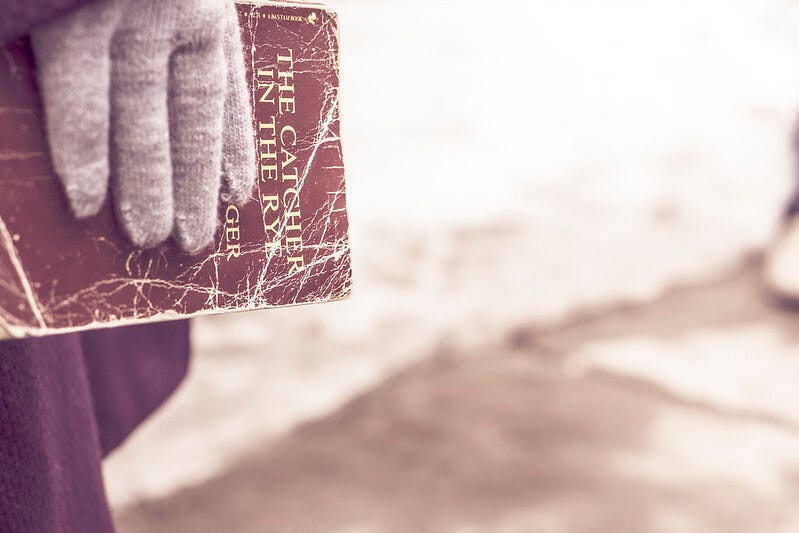J. D. Salinger’s The Catcher in the Rye turned 70 this week, and it’s an anniversary worth celebrating. Since it was first published, The Catcher in the Rye has established itself as a coming-of-age novel central to modern American writing. From Sylvia Plath’s The Bell Jar to Tobias Wolff’s This Boy’s Life, there is a long line of books that owe much to Salinger’s influence.
Editors were initially skeptical about The Catcher in the Rye. Before it was published by Little, Brown and Company, The Catcher in the Rye was rejected by Harcourt, Brace. In 1951, The New Yorker, which had been regularly publishing Salinger’s short stories, did not think The Catcher in the Rye was good enough to print excerpts from it.
But the recognition The Catcher in the Rye has earned since its acceptance has of late become a double-edged sword. The recognition has often been used to dismiss the novel as a period piece, appropriate for the post-World War II generation but otherwise superficial. A 2019 essay on The Catcher in the Rye in the Guardian described Salinger’s narrator, Holden Caulfield, as a “grouchy young man with no real problems.”
The college students I teach don’t look on The Catcher in the Rye as a book to read in defiance of their parents. They know The Catcher in the Rye as a book their parents and their grandparents read as teenagers. Holden Caulfield gets little sympathy from them. They dismiss his complaints much as the Guardian did.
When my students think of personal suffering and recent books about it, what comes to mind is the physical abuse Tara Westover describes as the child of survivalist parents in her memoir, Educated , or the five-year prison sentence Roy Hamilton, the victim-hero of Tayari Jones’ novel An American Marriage, endures for a crime he did not commit.
There is a serious problem with this he-didn’t-suffer-enough school of thought. It ignores how dealing with the challenges and requirements of middle-class and upper-middle-class life remains one of most important issues many students face in their teens and 20s. How they respond shapes the jobs they take, whom they marry, even how they vote.
In the 1950s the pressure to conform to middle-class life and its workplace values was described in great detail by William H. Whyte Jr. in his bestseller, The Organization Man. Holden Caulfield is no sociologist but he has a clear picture of what being an organization man would amount to for him. “I’d be working in some office, making a lot of dough, and riding to work in cabs and Madison Avenue buses,” he observes
What bothers Holden most are the inequities middle-class and upper-middle-class life promote. When he is told by his history teacher that life is a game, Holden’s first thought is that it is only a game for the winners. “If you get on the side where all the hot-shots are, then it’s a game all right—I’ll admit that,” he says to himself. “But if you get on the other side, where there aren’t any hot-shots, then what’s a game about it? Nothing.”
The great test for Holden is what he is going to do about the unfairness he sees around him. At 16, Holden lacks a plan of action. His substitute for a plan is to side with the vulnerable people he knows, whether it is the homely daughter of the headmaster at his prep school or the boy at another school who jumps out a window in despair over being bullied.
By the conclusion of The Catcher in the Rye, the only answer Holden has for how he intends to lead his life is to refuse to do what is expected of him. The Catcher in the Rye begins with Holden getting kicked out of his fourth school and ends with him refusing to tell the psychoanalyst his parents have sent him to whether he is going to apply himself when his new school year starts. “I mean how do you know what you’re going to do until you do it?” he insists.
For Salinger, who once observed that for a period in his life he was like Holden, Holden’s refusal to give the psychoanalyst the “right” answer carries with it enormous integrity. Holden gains more time to test his capacity to lead the independent life he craves. Seventy years later, Holden’s reply remains anything but dated.






Please note that we at The Dispatch hold ourselves, our work, and our commenters to a higher standard than other places on the internet. We welcome comments that foster genuine debate or discussion—including comments critical of us or our work—but responses that include ad hominem attacks on fellow Dispatch members or are intended to stoke fear and anger may be moderated.
With your membership, you only have the ability to comment on The Morning Dispatch articles. Consider upgrading to join the conversation everywhere.